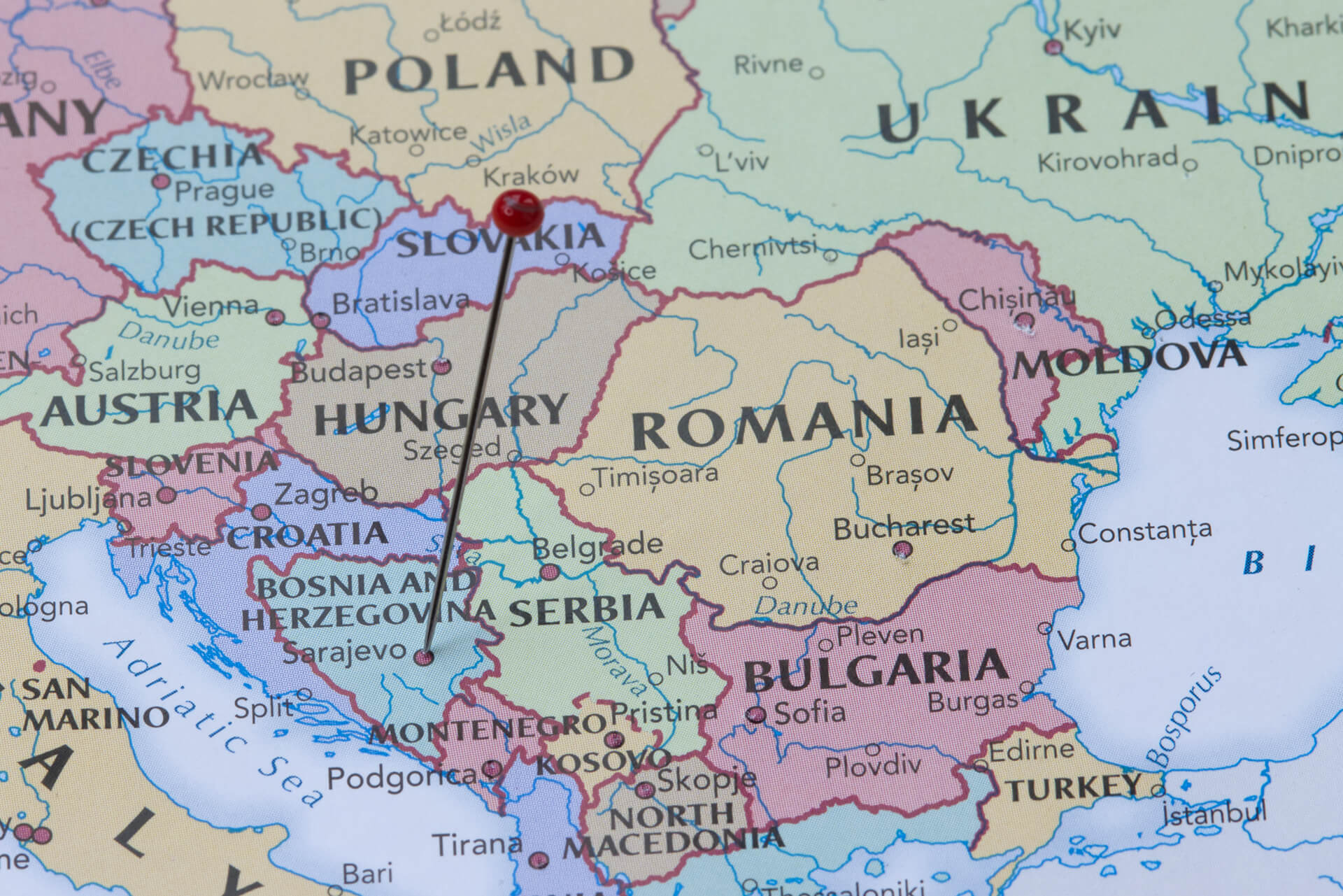Today, the war in Ukraine, the attempted coup in Russia and the unrest in France are making the headlines. Still, there is another crisis in Europe happening in Bosnia and Herzegovina. Known for its chronic political instability and dysfunctional institutions, the country is showing more signs of disintegration, encouraged by the West.
Similarly to the situation that emerged in 2021 when then High Representative for Bosnia and Herzegovina Valentin Inzko imposed amendments to the criminal code, the present crisis is due to the decisions of the current High Representative in this Balkan country.
Why we should care what happens in Bosnia
There are at least two reasons why we should pay attention to this crisis. First, it can potentially escalate, with unpredictable consequences for the region and the continent.
Second, it confirms that the proclaimed commitment of many Western governments to democracy, human rights and the rule of law is nothing but propaganda. This propaganda campaign hides the adherence to non-democratic procedures whenever these better serve imperial interests and political-economic goals.
On July 1, 2023, High Representative Christian Schmidt issued a series of legally binding decisions. Schmidt imposed amendments to the criminal code and declared that everyone who does not “apply, implement, enforce or otherwise comply with a decision of the High Representative in Bosnia and Herzegovina, or who prevents or otherwise obstructs its application, implementation or enforcement, shall be punished by imprisonment for a term between six months and five years.”
In addition, Schmidt issued decisions aimed at nullifying the previously approved laws by the parliament of Republika Srpska, one of the constitutive entities of Bosnia and Herzegovina. The parliament had determined not to implement the decisions of the Constitutional Court of Bosnia and Herzegovina on the territory of Republika Srpska until the federal parliament approves new legislation regarding the constitutional court. This would prevent foreigners from illegitimately serving as constitutional court justices in the country—which has been the practice since the end of the war in 1995.
The perception of the parliament majority and the leadership of Republika Srpska is that the constitutional court lacks legitimacy. They believe that this court has been making unconstitutional decisions that merely reflect the interests of Western political elites, disregarding the vital interests of the Bosnian constitutive entity.
A corrupt system without supervision
The Western press is rightfully reporting on authoritarian leadership in countries like Russia. However, there is a lack of coverage on Bosnia and Herzegovina, where the High Representative, who holds no democratic legitimacy, can overrule decisions made by the parliament, whose members are democratically elected. This power structure is the sad reality of the Western-backed neocolonial rule in Bosnia and Herzegovina.
The complicated institutional arrangement of today’s Bosnia and Herzegovina is primarily the result of the Dayton Peace Agreement, which ended the war in the former Yugoslav Republic. Annex 10 of this agreement calls for the establishment of the office of the high representative. As designated by Annex 10, the high representative coordinates organizations involved in the civilian aspects of a peace settlement, monitoring and resolving difficulties. The high representative also participates in donor meetings for rehabilitation and reconstruction.
However, the procedure for appointing the high representative was never clearly defined and lacked transparency from the beginning. The Peace Implementation Conference held in London in December 1995 only “approved the designation of Mr. Carl Bildt as High Representative,” inviting “the United Nations Security Council to agree to Mr. Bildt’s designation as High Representative.”
The Conference established the Peace Implementation Council (PIC), where the US-led coalition was the decisive voice that would appoint future high representatives and influence peace implementations. Originally, the steering board of the PIC was supposed to give political guidance on peace implementation to the high representative. There was an initial attempt to provide newly appointed high representatives a semblance of legitimacy by submitting the decision to the UN Security Council for approval. However, even this procedure has gone by the wayside.
Significant problems started with the “Bonn Powers,” referring to the process of PIC granting more authority to the high representative. In December 1997, at the PIC meeting in Bonn, the High Representative was authorized to make binding decisions on implementing the peace agreement, including measures against officials who “are absent from meetings without good cause” or who are “found by the High Representative to be in violation of legal commitments made under the Peace Agreement or the terms for its implementation.”
This vague formula allows for virtually unlimited powers over institutions and procedures in Bosnia and Herzegovina. The high representative became the supreme legislator and the judge, responsible only to his imperial masters and financiers. The rest of the institutions in Bosnia and Herzegovina are supposed to serve as obedient executors and do whatever the neocolonial governor tells them.
Based on these extraordinary powers, High Representatives started to overrule the decisions of elected representatives. They also began to annul and change state legislation and decisions made by local authorities, remove democratically elected officials and change state legislation as they found fit.
Success or failure is a matter of perspective
The power of unelected governors, without any democratic legitimacy, undermines the authority of the law approved by legitimate, elected state authorities. Western democracies, of course, do not see a problem, and the mainstream Western media do not report on such abominations within a political system of a European country. Authoritarianism is fine, as long as the autocrats are “our” guys.
Some call Bosnia and Herzegovina an epic failure of the West and the US-led coalition to build a sustainable and democratic country after the bloody war of the 1990s. Others see it as a successful case of preventing democratic development, reasoning that the policies and post-war design of Bosnia and Herzegovina were intended to prevent the country from being a functioning state and a meaningful democracy.
The territory of Bosnia and Herzegovina remains unstable and is a stage for implementing neo-liberal policies in agreement with corrupt local elites. When there is a crisis initiated or enhanced by imperial policies, the Western empire will act as if they are rescuing people from their tribal leaders who lack sophisticated democratic culture. The lesson that the native population in every colony is supposed to learn is that only (neo)colonial masters can set you free.
[Lane Gibson edited this piece.]
The views expressed in this article are the author’s own and do not necessarily reflect Fair Observer’s editorial policy.
Support Fair Observer
We rely on your support for our independence, diversity and quality.
For more than 10 years, Fair Observer has been free, fair and independent. No billionaire owns us, no advertisers control us. We are a reader-supported nonprofit. Unlike many other publications, we keep our content free for readers regardless of where they live or whether they can afford to pay. We have no paywalls and no ads.
In the post-truth era of fake news, echo chambers and filter bubbles, we publish a plurality of perspectives from around the world. Anyone can publish with us, but everyone goes through a rigorous editorial process. So, you get fact-checked, well-reasoned content instead of noise.
We publish 2,500+ voices from 90+ countries. We also conduct education and training programs
on subjects ranging from digital media and journalism to writing and critical thinking. This
doesn’t come cheap. Servers, editors, trainers and web developers cost
money.
Please consider supporting us on a regular basis as a recurring donor or a
sustaining member.
Will you support FO’s journalism?
We rely on your support for our independence, diversity and quality.






Comment